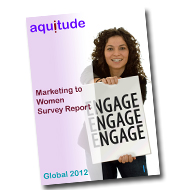
The full report from our ‘Marketing to Women’ survey has been published. You can download it exclusively at the bottom of this post.
In this survey, Aquitude’s Purl Influencer Panel, in association with the UK’s Chartered Institute of Marketing’s ‘Women in Marketing’ network, aimed to uncover how female professionals perceive corporations are embracing this new growth market – both as consumers and, also, as Marketing practitioners.
In detail, the survey aimed to uncover:
- What is driving the dissatisfaction of female consumers?
- Which brands are perceived to be marketing to women effectively? Which are not?
- How can global corporations address challenges in targeting this growing market?
- Is the corporate gender-brain drain at fault as less and less women make it up the corporate ranks?
This survey was open to members of the Purl Influencer Panel from around the world, as well as the UK’s Chartered Institute of Marketing’s ‘Women in Marketing’ network. Respondents included professional women, work in the USA, Australia, UK, Europe, Asia and the Middle East. Participants work in a wide variety of industries including Advertising, Financial Services, Consumer Goods, Retail, Energy as well as entrepreneurial roles.
Some of the findings included:
What do women want? They want to be engaged honestly without marketing tricks or gimmicks.
There is a need for continuity when it comes to the brand values and the shopping environment – the emotional response at the point of sale continues to be a big influence on the way brands are perceived.
“Likes” do not drive women’s needs – the primary purpose for using social networks is to interact with friends first and foremost and brands second, if at all.
Brands need to engage in dialogue with the female market.
Women have multiple roles and marketing professionals should adapt their communications accordingly.
The worst sectors at marketing to women are IT (over 40% of respondents say the sector is doing a bad job), Financial Services and the Automotive sector.
Dove and L’Oreal are seen to be getting it right, but Olay on the other hand has more neutral perceptions about its female-centric marketing.
Microsoft and Blackberry are losing the software battle.
Banks and Financial Services trail behind – with global brands Citi and Barclays trailing the most.
The panel believes that the lack of gender diversity in corporate boardrooms, as well as in Marketing positions, is the clear culprit in companies losing touch with their female consumers.
[box]Download the Marketing to Women Report. Fill our your email address to get the link to the download. [email-download download_id=”2″ contact_form_id=”1579″][/box]